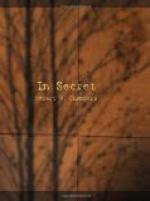Silver, russet, green and gold, and with the myriad fulvous nuances that the, forest undertones lend to its ensembles, these were the patterned tints that met his eye on every side in the subdued gradations of woodland light.
But nothing out of key, nothing either in tone, colour, or shape, betrayed the discreet and searched for discord in the vague and lovely harmony;—no spiked head tossed in sudden fright; no chestnut flank turned too redly in the dim ensemble, no delicate feet in motion disturbed the solemn immobility of tree-trunk and rock. Only the fern fronds quivered where spray rained across them; and the only sounds that stirred were the crystalline clash of icy rapids and the high whisper of the leaves in Les Errues.
And, as he stood motionless, every sense and instinct on edge, his eyes encountered something out of key with this lovely, sombre masterpiece of God. Instantly a still shock responded to the mechanical signal sent to his eyes; the engine of the brain was racing; he stood as immobile as a tree.
Yes, there on the left something was amiss,—something indistinct in the dusk of heavy foliage—something, the shape of which was not in harmony with the suave design about him woven of its Creator. After a long while he walked slowly toward it.
There was much more of it than he had seen. Its consequences, too, were visible above him where broken branches hung still tufted with bronze leaves which no new buds would ever push from their dead clasp of the sapless stems. And all around him yearling seedlings had pushed up through the charred wreckage. Even where fire had tried to obtain a foothold, and had been withstood by barriers of green and living sap, in burnt spaces where bits of twisted metal lay, tender shoots had pushed out in that eternal promise of resurrection which becomes a fable only upon a printed page.
McKay’s business was with the dead. The weather-faded husk lay there amid dry leaves promising some day to harmonise with the scheme of things.
Mice had cleaned the bony cage under the uniform of a British aviator. Mice gnaw the shed antlers of deer. And other bones.
The pockets were full of papers. McKay read some of them. Afterward he took from the bones of the hand two rings, a wrist-watch, a whistle which still hung by a short chain and a round object attached to a metal ring like a sleigh-bell.
There was a hollow just beyond, made once in time of flood by some ancient mountain torrent long dry, and no longer to be feared.
The human wreckage barely held together, but it was light; and McKay covered it with a foot of deep green moss, and made a cairn above it out of glacial stones from the watercourse. And on the huge beech that tented it he cut a cross with his trench-knife, making the incision deep, so that it glimmered like ivory against the silvery bark of the great tree. Under this sacred symbol he carved:




